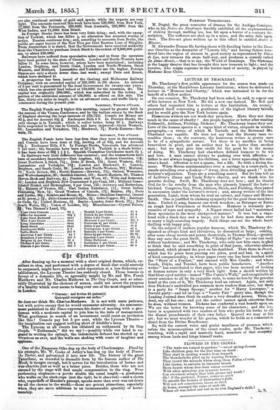LECTURE -BY THACKERAY.
Mr. Thackeray's first public appearance for the season was made 'on Thursday, at-the Marylebone Literary Institution ; where he-delivered a lecture on " Humour and Charity," which was intimated to •be for -the benefit of a fellow author.
On one occasion, Mr. Thackeray had been asked, he said, to repeat one of his lectures at New York. He did a new one instead. Mr. -Bell and others had requested him to lecture at this Institution. An occasi.e- presented itself concerning a gentleman of the highest literary talents, and he would give the New York lecture again. Humorous writers are our week-day preachers. Have they not done much in the cause of charity ? Are people happier or better after reading Goldsmith, Addison, Fielding, Dickens ? Mr. Thackeray hopes, they are. Love of the human species is a vague kind of virtue, eloquent in written paragraphs,—a virtue of which M. Tartuffe and the Reverend - Mr. Chadband are capable. He does not say that the literary 'man re- sembles these; on the contrary, the humorous writer is -pretty sure to be of a sympathetic nature. Yet there is no sacrifice in being benevolent in print, and an author may be no better than another man ; but we may give him credit for the good he is the 'means Of doing. Mr. Thackeray had elsewhere defined humour to be wit and love. A man cannot always be gushing over with ellbetion : a Wirer is not always hugging his children, nor a lover squeezinglris mis- tress's hand. Affection is not h spasm, but a life. 'So with a loving -hu- mour. When Sterne sentimentalizes over a carriage in a court-yard, 'or stands snivelling over a donkey—" Away, thou drivelling quack !" is the lecturer's adjuration. Tears are a something fumed. But let him tell us of Leferre's illness and Uncle Toby's charity, and we thank -him for genuine feeling. Swift, Mr. Thackeray does not love ; and -he thanks God for it—he revolts from the man who placards himself the hater of his kind. "Congreve, Gay, Prior, Addison, Steele, and Fielding, then passed in succession under 'the lecturer's review ; and, among writers bf.the generation, Lamb, from whom he read an extract, and James and Home° Smith. One is justified in claiming sympathy for the good these 'men have done. United to song, humour can work wonders; as Beranger or Burns on rough hard Frenchmen or Scotehmen. Humour is intensely pro- vocative of tears and sympathy. A Nigger street ballad had "moistened these spectacles in the most unexpected manner." It was but a vaga- bond with a black face and a banjo, yet he had done more than ever so many a high-sounding tragedy. Such things can set the whole heart thrilling with happy pity. On the subject of modern popular :humour, which Mr. Thackeray de- signated as always kind and chivalrous, he descanted at large ; coming, after some cheap novels and penny theatricals, to Thomas Hood,—greater than any save the great Swift. His " Bridgeof Sighs" no one-can read without tenderness ; and Mr. Thackeray, who only saw him once, is glad to think that he said something in print of that'poem, otherwise almost unnoticed, which pleased the poet on his deathbed. Then there is Burch, which has for years been pouring out jokes, good and bad, in a spirit of kind companionship; in whose pages every one has been touched with the "Story of a Feather," and amused with Mrs. Caudle ; and where Leech, Doyle, and Tannic], have been public benefactors. "Another writer" has contributed to that paper, who has been accused of -looking at human nature in only a very black light : from a sketch written by that blear-eyed-satirist—named "The Curate's Walk;" and recogni2ablent every sentence to all by its exquisite style, to some no less by the genuine heart at the core of it., air. Thackeray read an extract. Again, mit only does Dickens's unrivalled pen summon more readers than ever, but there is a party for " Soapy Sponge," another for " Harry Lorreqiier," a Jerrold party—and let us hope a "Vanity Fair" party also, though the Leading Journal does think its author a very dreadful person. Thus, in- deed, say all but one ; and .yet the author cannot speak otherwise than ho does, without treason. Dickens has conferred a vast benefit upon us. We are the better for knowing some of his characters ; and the lec- turer is acquainted.with two readers of him who prefer his books to all the dismal preachments of their own father. Quarrel we may at his art ; we must wonder St his genius, 'which he holds as a commission direct from the Divine Beneficence.
So, with the earnest voice and genial manliness of presence 'which rellite the misconceptions of 'the closet reader, spoke Mr. Thackeray; touching, with a rapid and masterly hand, members of that eenspairy among whose lords and kings himself ranks.


























 Previous page
Previous page